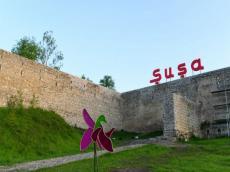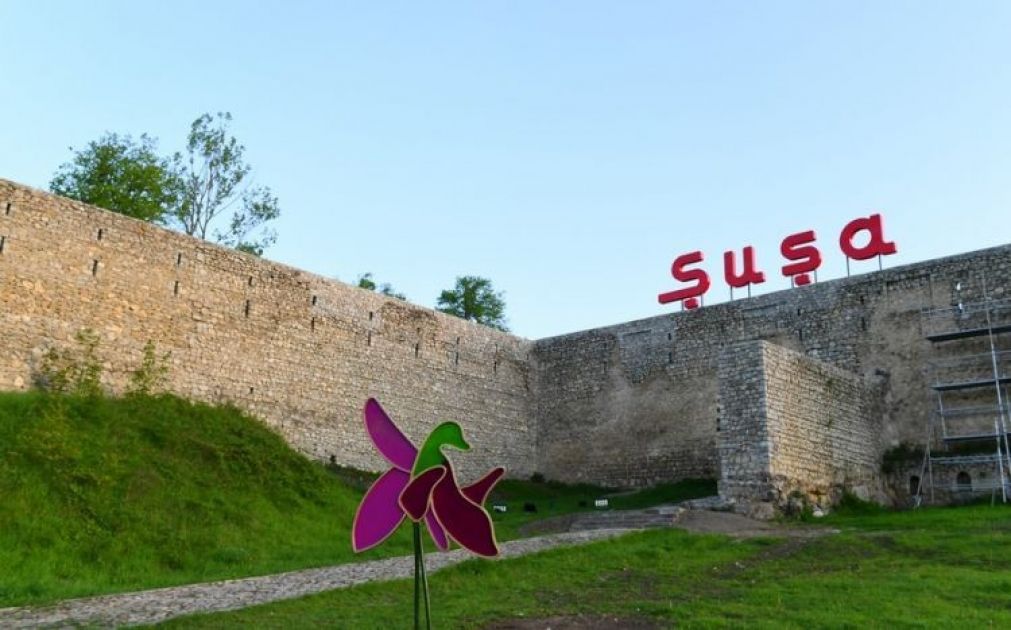|
|
TODAY.AZ / Weird / Interesting
Restored libraries in Shusha to turn into centre for intellectual engagement
24 January 2024 [16:18] - TODAY.AZ

Libraries play a major role in preserving knowledge, fostering education, and promoting cultural heritage.
For centuries, Shusha city has been known as the cultural centre for Azerbaijani people.
With diverse collections, the libraries in Shusha stood as pillars of knowledge, preserving the city's cultural heritage and promoting intellectual growth.
The first library-reading room in Garabagh was established in Shusha. In 1896, the French language teacher of Shusha Realni School, Ahmet Bey Aghaoglu, opened a new library for the people of Shusha under the name of a Muslim reading room in Shusha. Some sources also state that the reading room has been operating for three years and the book fund has reached 500 copies.

At that time, the expansion of the school network in Shusha increased the demand for textbooks, which, in turn, necessitated book printing. Mir-Mohsun Navvab, who was one of the prominent personalities and progressive intellectuals of his time, established a printing house that printed books using the lithography method in early 1884.
As book printing expanded, there was a need for a place where they could be collected and used. Mir-Mohsun Navvab, who understood the importance of learning science, books, and reading, opened the next library and reading room in the courtyard of Govhar Agha Mosque in 1903.
Some sources even mentioned the information about the work of his son, Mirish Agha, in this library. The books printed in the Navvab's printing house were kept in Shusha libraries and presented to a wide readership.
Scholars of the time gathered in those libraries and held discussions about science, education, and literature. Thus, a scientific, cultural, and literary environment was formed in Shusha.
The libraries in Shusha housed an extensive collection of books, manuscripts, and historical documents that reflect the diverse heritage of Azerbaijan.
As a result of Armenian vandalism, hundreds of cultural institutions, including 927 libraries with 4.6 million books and other institutions, were completely destroyed.
After the restoration of its territorial integrity in 2020, Azerbaijan started the restoration works in the liberated territories.
The Culture Ministry launched a campaign, "Let's go with a book to Garabagh," in partnership with the Azerbaijani National Library to restore libraries in Garabagh.
The project aims at restoring the book funds of more than 900 libraries in the liberated territories.
Since 2020, a large number of books have been donated to the Garabagh Book Fund by a number of international organisations working in the field of culture, Turkic-speaking countries, famous foreign and local authors, publishers, and print houses.
The Turkish Professional Union of the Authors of Scientific and Literary Works (ILESAM) donated 10,000 books to the fund of libraries to be restored in Garabagh.
Around 500 books were donated by People's Writer Elchin Afandiyev. The Institute of Education also joined the book campaign, presenting some 5,263 copies of 300 books.
The embassy of Kazakhstan handed over books on science, culture, and history, as well as anthologies of Kazakh prose and poetry.

Around 93,212 books have been collected within the project "Let's go with a book to Garabagh".
In the near future, libraries in Azerbaijan's liberated territories will be restored, serving as community centres for intellectual engagement and lifelong learning.
As Shusha continues to flourish, its libraries will undoubtedly play a major role in shaping the intellectual landscape and preserving Azerbaijan's rich cultural legacy.
URL: http://www.today.az/news/interesting/243977.html
 Print version
Print version
Connect with us. Get latest news and updates.
See Also
- 07 February 2026 [12:00]
Court allows Trump to detain immigrants without bond - 25 January 2026 [22:33]
Scientists solve 66 million-year-old mystery of how Earth’s greenhouse age ended - 20 January 2026 [14:34]
Spain train crash death toll rises to 41 after high-speed derailments - 19 February 2025 [22:20]
Visa and Mastercard can return to Russia, but with restrictions - 05 February 2025 [19:41]
Japan plans to negotiate with Trump to increase LNG imports from United States - 23 January 2025 [23:20]
Dubai once again named cleanest city in the world - 06 December 2024 [22:20]
Are scented candles harmful to health? - 23 November 2024 [14:11]
Magnitude 4.5 earthquake hits Azerbaijan's Lachin - 20 November 2024 [23:30]
Launch vehicle with prototype of Starship made its sixth test flight - 27 October 2024 [09:00]
Fuel prices expected to rise in Sweden
Most Popular
 Guarantees of peace from Armenia: questions remain
Guarantees of peace from Armenia: questions remain
 Azerbaijani NGOs urge UK parliament to halt “biased” inquiry on Karabakh
Azerbaijani NGOs urge UK parliament to halt “biased” inquiry on Karabakh
 US top general Caine thinks war with Iran can be 'easily won'
US top general Caine thinks war with Iran can be 'easily won'
 Former UK ambassador Peter Mandelson detained in London over Epstein-linked probe
Former UK ambassador Peter Mandelson detained in London over Epstein-linked probe
 Remote privatization: how Ruben Vardanyan "distributes" earth from camera
Remote privatization: how Ruben Vardanyan "distributes" earth from camera
 Vietnam plans national database center to fight misinformation
Vietnam plans national database center to fight misinformation
 Lords and baronesses got entangled in controversy over “Armenian question
Lords and baronesses got entangled in controversy over “Armenian question
